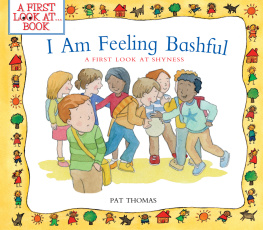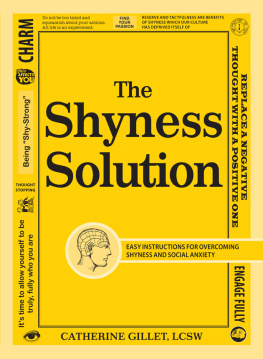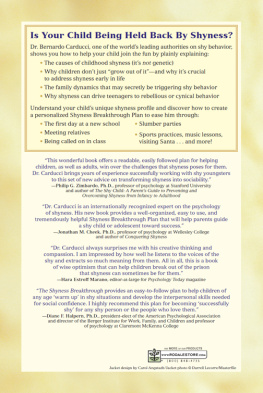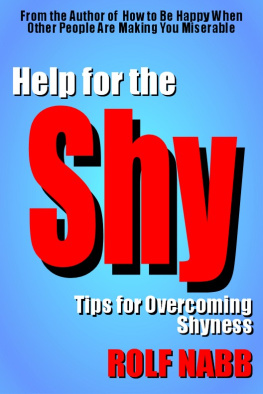Shyness
A Bold New Approach
Managing Your Shyness at Work
Making Small Talk
Navigating Social Situations
Parenting a Shy Child
Bernardo J. Carducci, Ph.D.,
WITH S USAN K. G OLANT , M.A.
R ESEARCH IN COLLABORATION WITH L ISA K AISER , M.A.

This book is dedicated to
Edward, my father, and to the memory of Mary, my mother,
Jan, my wife, and
Rozana, my daughter,
all of whom have never been shy
about giving me their love and support
Contents
In addition to the thousands of individuals who have written to and talk with me about their shyness over the past twenty years, there are some special individuals whose personal involvement made Shyness possible. These friends of Shyness are: Marie Benz, Jan Carducci, Rozana Carducci, the Carducci Family, Jane Clark, Sue Campo, Mark Clark, Melissa Clark, Kathie Festo, Kimberly Gonzales, Joan Goldstein, Robin T. Marks, Nicole Moodie, Neil Pergament, Andrew Riconda, Michelle Wendy Vorob, Sara Whitely, Gayle Kremer Sallee, Melvyn M. Koby, J. David Lynch, Nancy Gores, Lauren Kennedy, the Kaiser Family, The Writers Room, Vito Scalfani, Lateefah Torrence, Bernard Dunleary, John Burke, the Wheatly Family, Nancy Totten, and Hillary J. Epstein. Finally, no mention of this list of friends would be complete without acknowledging Shyness s best friend Lisa Kaiser. As my research associate, Lisas played a major role in helping to develop many of the important conceptual and pragmatic elements of Shyness . Whenever it was needed, Lisa kept asking these thought-provoking questions that helped me clarify my ideas. From her involvement with the initial book proposal and early drafts of the manuscript, Lisas literary and intellectual contributions to Shyness were limitless. Shy individuals for many years to come will benefit from Lisas creative and insightful participation with Shyness .
There are two other very special individuals who have become a major part of my life since I began working on Shyness . Elyse Cheney, my agent, was the first person to suggest the possibility of Shyness . Elyse guided me through the preliminary stages of this project with all of the skill, energy, and authority required to get Shyness up and running. At HarperCollins, I offer my deepest gratitude to Megan Newman, my editor. Megan provided the type of support, feedback, and confidence you would hope to find in an editor, but always expect in a true friend. It pleases me to say that while working on Shyness , Megan exceeded my expectations in the former and has also become the latter. To work with such a friend has been a joy.
All of these friends have contributed to Shyness in their own special way. To all of them I say, Thanks. I couldnt have done it without you.
BJC
If you are shy, youre not alone. One of the tricks shyness plays on the mind is that it creates feelings of isolation. But shy people are not alone. They make up almost half of the population, and about 95 percent of us know first-hand what it means to be shy in some situations. We also know that shyness is not simply defined as the failure to respond appropriately in social situations, as it once had. Its not introversion, being tongue-tied, having stage fright, or being a wallflower. Shyness addresses these and many other myths and misinformation about shyness by examining and synthesizing what is known about shyness in a practical manner that will make it possible for you to use this information in your own everyday living experiences. By providing a deep understanding of shyness and explaining now to use this information, Shyness will enlighten and empower people who feel theyre cut off from the world.
Shyness will also challenge shy people to speak for themselves. Along with explanations of real-life shy experiences, Ill provide coping strategies for shy people to expand their comfort zone in the most common but significant interactions, such as parenting, dating, public speaking, working, traveling, and exploring the Net. Shyness will provide you with the basic principles of understanding the unique expression of your shyness.
Part I of Shyness presents a personalistic view of shyness by focusing on the general experience of shyness. It will deal with the most frequently asked questions about shyness, help you assess your own shyness, unravel common myths and misconceptions about shyness, present a new view on shyness to help you understand your shyness, and provide you with strategies to respond successfully to your shyness.
Part II presents a holistic view of shyness by addressing shyness of the body, mind, and self. It discusses how the body can create shy symptoms, the errors in thinking associated with shyness of the mind, the personal misconceptions that contribute to shyness of the self, and effective alternative responses to these three dimensions of shyness.
Part III presents a life cycle view of shyness by exploring the possibility of being born shy, the expression of shyness during childhood and adolescence, and the turmoil of shyness in adulthood. Strategies for parenting the shy child, understanding and helping the shy teen, and navigating those social situations that most often produce shyness in adults are presented.
Part IV presents a world view of shyness by discussing shyness in the context of love, work, culture, and technology. Strategies for establishing and maintaining intimate relationships, responding to daily interactions with coworkers, adjusting to cultural diversity, and meeting the challenges of rapid changes in technology are presented.
As you can see, Shyness is not just about shyness. It is about your shyness and how to understand and respond successfully to it personally, holistically, developmentally, and globally. Such an approach demonstrates an appreciation for the true complexity of shyness and reflects my belief that shy individuals can live, work, and love successfully by continuously expanding their comfort zone in an ever-changing global environment.
If you are shy or live, work, or are in love with a shy person, Shyness has much to offer you. Lets begin your journey into Shyness: A Bold New Approach .
When I speak to someone, I usually get nervous and uncomfortable. I talk very fast, mumble my words, stutter. I dont talk loud enough for others to hear, so Im constantly repeating myself .
I egotistically take other people to be noticing and criticizing my behavior much more than they probably do. I set excessively high standards for myself, expecting a smoothness, quality, and ease of interaction that a nonshy person wouldnt dream of expecting .
When I was younger, I was very quiet with strangers and in social situations. I was a completely different person when I was with my family and friends. I have a great sense of humor and a lot of personality that seemed to disappear in public. Today there is an ongoing struggle and inner badgering during social situations .
Life is hell, when you cannot even talk because of fear of saying something dumb .
When I was younger, people thought I was stuck-up, and they didnt like me. That hurt a lot .
A couple of years ago, I had gum surgery. I found this prospect less nerve-wracking than going to a party that was held at about the same time !
These are the voices of people whose shyness causes them pain and limits their choices. But shyness is a multidimensional, multifaceted personality trait. Since no two shy people are alike, your experience of shyness need not be as distressing. Throughout this book, you will hear from other individuals who, like yourself, are trying to understand their shyness in order to live a successfully shy life .














